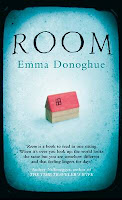And so the day that the 2010 Booker Prize is announced comes around again. A day spent trying to imagine what the judges might be thinking and impotently campaigning for one’s favourite(s). I have read two of them – Room by Emma Donoghue and In a Strange Room by Damon Galgut – and although they are about as different as two works of fiction can get, I enjoyed each one tremendously and they have a common theme on inter-personal relationships as they develop in unusual situations.
Reading the books, however, has never been a pre-requisite for talking about the Booker Prize, so here are my thoughts on the chances of each title.
Parrot and Olivier in America by Peter Carey was met with a lukewarm reception by critics and readers when it was published earlier this year, but Andrew Motion has been effusive in his praise for Carey (“one of the writers I feel most pleased to be alive at the same time as”) and there seems to bit of momentum behind him. Giving the Booker to Carey again would be a big decision for the judges to take, and I suspect some may feel it is not worthy of such praise, but it could be open to a compromise vote.
Room by Emma Donoghue would be a popular choice, and in terms of sales figures it is a clear winner regardless of what happens tonight. It is a powerful and compelling story, and given the preponderance of plot driven novels on the longlist it would seem that readability is something the judges prize highly. However, while I would be very happy to see it win, I suspect its best chance is as a compromise.
In a Strange Room by Damon Galgut is a beautiful novel, whose power derives from its atmospheric sparseness and lack of hyperbole. It touched me, perhaps more than any other book I have read this year, leaving a sense of loneliness deep in my marrow. The protagonist’s search for something through travel is a quietly resonant one. In another author’s hands, the mix of first and third person perspectives could grate, but Galgut uses it effectively to convey a sense of transient memory and, perhaps, question the borders between fiction and biography. It is classic Booker territory and would be a safe, literary choice.
Howard Jacobson has described The Finkler Question as his best work yet, and his tale of what modern Jewishness means comprises his trademark comedic elements. However, it appears to have divided readers and comedy doesn’t have much history of success in winning the Booker. I would be surprised if it picks up the prize tonight.
The Long Song by Andrea Levy is a set in Jamaica during the last turbulent days of slavery and the early years of freedom that followed. A possible dark horse, it has somewhat slipped under the radar but would prove a popular winner.
C by Tom McCarthy is the Bookies favourite. It stands out as stylistically different both from the other shortlisted titles, and the original longlist which makes me think it has at least one judge advocating it strongly, and if this is Andrew Motion (looking at what he has said about each of the books this seems very possible) then I suspect it will win.
The BBC Review Show panel were split between Tom McCarthy’s C, The Finkler Question by Howard Jacobson and In a Strange Room by Damon Galgut although I’d be surprised if Jacobson is in with a realistic chance.
The village of Comrie in Perthshire went for Room by Emma Donoghue in a BBC Culture Show special.
My heart says In a Strange Room by Damon Galgut would be a wonderful and deserved winner and my head thinks it is in with a chance. My guess is that it will be a battle between Galgut and McCarthy, but that could also open it up for a compromise vote, from which either Donoghue, Carey or Levy could benefit.
GET OFF THE FENCE!
Oh, okay. C will triumph, but that probably kills its chances! In the 6 years that I have been trying to predict it, I have never once been correct.
So what will?
You tell me.









